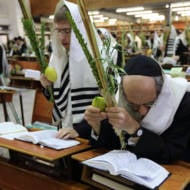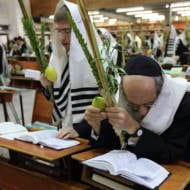
LAST CHANCE: Hoshana Rabba – The Final Day of Judgement is Here

“If atonement is not granted on Rosh Hashana, I will grant it on Yom Kippur, and if they do not attain atonement on Yom Kippur, I will grant it on Hoshana Rabba.”
By Rabbi Ari Enkin, Rabbinic Director, United with Israel
The seventh day of Sukkot, known as “Hoshana Rabba,” is a very mysterious and misunderstood day. Although it is essentially another day of Sukkot, we are told that it is actually a day of judgment – similar to Yom Kippur!.
Hoshana Rabbah is said to be the day when our fate for the New Year is completely sealed following the initial Yom Kippur decision. (There is even a view that the final sealing from Yom Kippur takes place on Chanuka, but that is a topic for another time).
As the Midrash (rabbinic literature) says: “If atonement is not granted on Rosh Hashana, I will grant it on Yom Kippur, and if they do not attain atonement on Yom Kippur, I will grant it on Hoshana Rabba.” There is also the teaching that the words of Isaiah – “They seek me day after day” (58:2) – refer to the first “day” of judgment, Rosh Hashana, and the last “day” of judgement, Hoshana Rabba.
Although the Torah does not give this day any special status, the Jewish people have given it a solemn character similar to Yom Kippur, though work is permitted on Hoshana Rabba like on the other intermediary days (Chol Hamoed) of Sukkot.
There is, however, one ritual, that is unique to Hoshana Rabba, not performed on any other day of Sukkot, and that is the ritual of the willow branch, according to which we take a bundle of five willow branches and circle the altar in the synagogue to commemorate the same having been done in the Holy Temple in Jerusalem. This is done seven times.
While circling the altar, prayers are recited for all types of personal, communal, and worldwide needs. The Torah is removed from the ark during this ceremony. Afterwards, the willow branches are beaten on the ground, which is said to destroy any negative forces that might stand in the way of a good year. Note: The shaking of the lulav is performed on Hoshana Rabba just like it is on all the other days of Sukkot.
A number of customs have developed throughout the generations in order to remind us of the significance of the day. For example, many people remain awake all night long on Hoshana Rabba, reading the book of Deuteronomy and reciting Psalms.
The book of Deuteronomy was chosen for this purpose because it discusses the importance of loving and fearing God and keeping the commandments of the Torah, a very approproate theme for a day when God is sealing our fate.
There is also a custom for the rabbi of the congregation to distribute sweet apples to the congregants. These apples are then taken home, dipped in honey, and eaten in the sukkah.
A festive meal is eaten on Hoshana Rabba. Bread is dipped into honey for the last time and, in Ashkenazi homes at least, soup with “kreplach”—dough filled with ground beef or chicken, folded into triangles—are eaten.
Indeed, in Ashkenazi homes, kreplach are traditionally served on Rosh Hashana, at the pre-fast meal before Yom Kippur, and on Hoshana Rabbah. This is because the ground beef, or other filling, is “hidden” in the wrapping, symbolizing the hidden meanings of each of these days. The final judgement on how our year is to unfold is “hidden” from us, of course, making the kreplach appropriate for Hoshana Rabba, when we are judged and sealed. Festiveclothes are worn, and some have the custom of wearing white, like on Yom Kippur.
Do You Love Israel? Make a Donation – Show Your Support!
Donate to vital charities that help protect Israeli citizens and inspire millions around the world to support Israel too!
Now more than ever, Israel needs your help to fight and win the war — including on the battlefield of public opinion.
Antisemitism, anti-Israel bias and boycotts are out of control. Israel’s enemies are inciting terror and violence against innocent Israelis and Jews around the world. Help us fight back!
The post LAST CHANCE: Hoshana Rabba – The Final Day of Judgement is Here first appeared on United with Israel.
United with Israel
